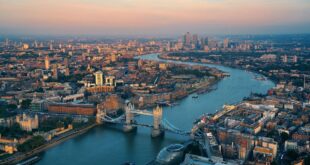“The more we go for clean energy, the more resistant we are to global conflicts because nobody can take solar or wind as a hostage,” International Energy Agency boss Dr Fatih Birol told Euronews.
Global instability has dramatically affected both the supply and, as a consequence, the price of energy in recent years.
Energy costs aren’t the only thing holding back Europe’s competitiveness, but pricing shock certainly hasn’t helped.
While the bloc races to decarbonise in time to achieve climate goals, can it withstand any more crises?
In this episode of The Big Question, executive director of the International Energy Agency (IEA), Dr Fatih Birol sits down with Hannah Brown to discuss how the drive for clean energy will make Europe more resilient to crises.
How are global conflicts affecting the energy transition?
The main sentiment held by Dr Birol is that, whilst conflict continues, countries cannot work together to tackle issues such as climate change.
When asked what changes he hopes to see before the next World Energy Outlook, a report published by the IEA every October, Dr Birol said he wants to see countries come together “and try to get some consensus on how we go forward”.
Despite the lack of global collaboration, and perhaps surprisingly, because of conflict and crises, the race for renewable energy has sped up.
“The more we go for clean energy, the more resistant we are to these crises because nobody can take solar or wind as a hostage,” Dr Birol told Euronews.
“The more these energy security threats, as a result of the political tensions we see, the stronger the push for clean energies, not only for climate change reasons, but for energy security reasons.”
According to Dr Birol, we are entering “the age of electricity”, and the majority of it is produced from clean energy.
Solar, wind, hydropower and nuclear make up a big part of Europe’s clean mix but Dr Birol suggests geothermal energy should become a more important ingredient in the bloc’s energy cocktail.
“This can help us to generate electricity without interruption,” Dr Birol explained, adding that, unlike wind or solar, it’s available 24/7.
“We are working hard to bring the cost of geothermal energy down so that it also complements solar and wind.”
The Big Questionis a series from Euronews Business where we sit down with industry leaders and experts to discuss some of the most important topics on today’s agenda.
Watch the video above for the full conversation with Dr Fatih Birol from the International Energy Agency.
Video editor • Nicolas Coquet
 topnaijanews Stay informed with the latest Nigerian news at your fingertips
topnaijanews Stay informed with the latest Nigerian news at your fingertips
